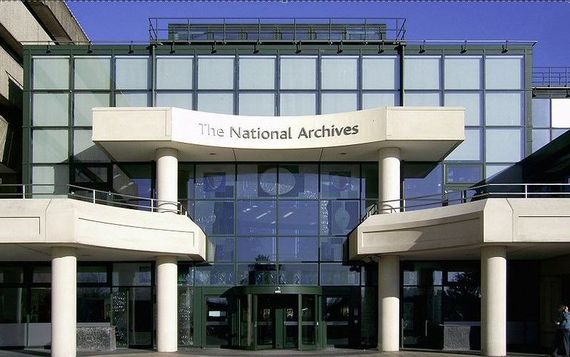“Archives are the most faithful reflection of the history of a people and thus constitute the most explicit memory of nations”
-Antonio Gonzalez Quintana
Last month’s report by the Guardian that thousands of files related to some of the most contentious parts of British colonial history have gone missing from the National Archives seems to support the claim—long-held by campaigners for truth and accountability in Northern Ireland—that the British government has something to hide.
The National Archives’ response seemed to be to shrug its shoulders. Their own code of conduct shows that they endorse the International Council on Archives’ (ICA) Code of Ethics, yet the loss of Troubles-related documents suggests otherwise.
In 1997, Antonio Gonzalez Quintana produced a report for UNESCO on behalf of the ICA entitled Archives of the Security Services of Former Repressive Regimes. Its purpose was to highlight the importance of managing “documentary heritage” in post-conflict countries engaged in transition to democracy, as well as to propose a code of ethics with regard to the way historical documents are handled.

The National Archives (Via: Nick Cooper / Wiki)
Quintana, a Spanish archives expert critical of his own government’s archival policy, shines a light on the ways in which the security forces of repressive regimes worked on a daily basis to collect information on individuals. In fact, he argues that this was often the only way the regime was able to maintain its power. Police and intelligence archives in particular can shed light on these agencies’ motives and behavior during periods of conflict.
“In contrast to the public image which such regimes have tried to present, their real nature can be discovered in the files and indices of the security services,” asserts Gonzalez Quintana.
This is certainly the case in Northern Ireland, where the behavior of British security forces and the RUC during the Troubles as outlined in government files stand in such stark contrast to their public statements.
Ciarán MacAirt is no stranger to the struggle against British intransigence when it comes to confronting the legacy of the past. To say that MacAirt was not surprised about the most recent batch of missing files would be an understatement.
“Welcome to our world,” he wrote on Twitter.
MacAirt is the founder of Paper Trail, a family-led organization and social enterprise that works to uncover archival evidence in support of family-centered truth-recovery efforts in Northern Ireland. Paper Trail is an effort which grew out of MacAirt’s own pursuit of truth: his grandmother, Kathleen Irvine, was one of fifteen people killed in the bombing of McGurk’s Bar in Belfast in 1971.
The story of the bombing and the subsequent family-led campaign to clear the names of their loved ones is chronicled in a book MacAirt published in 2012, although the campaign is far from over.
“The police and the British state have been very consistent in their failure to investigate the mass murder of McGurk’s Bar,” says MacAirt.
“We created the charity, Paper Trail, to help other families target and retrieve information in public records so they would not have to feel the same despondency that our families may have felt when dealing with statutory bodies.”
He says he has been confronting the British state’s “monolith of lies” for most of his adult life, even taking the British Ministry of Defence, the National Archives, and the Information Commissioner’s Office to court over a specific file related to his grandmother’s murder. As it turned out, the missing file contained information about the placement of the bomb at McGurk’s bar, which contradicted the initial narrative of events put forth by the security forces. The court battle lasted three years, and resulted in a partial victory for MacAirt.
What’s become clear through the work of the McGurk’s campaign and Paper Trail is that authorities have not provided families, or even the courts, with all the available evidence related to their cases.
As recently as December, the McGurk’s Bar families learned in open court that former British agent and UVF commander, Gary Haggarty, passed along information related to the bombing to his police handlers. According to MacAirt, this was known to the PSNI and the Police Ombudsman’s office, yet unlike other families affected by Haggarty’s testimony, none of the McGurks families were contacted prior to court, nor was Haggarty’s information ever investigated or recorded in official reports.
Given their decades-long campaign for truth, this could hardly be an oversight. But regardless of whether this treatment is intentional, one thing is clear: the treatment of the families, even in the face of their ongoing suffering, is not a concern in the eyes of the British government. It simply doesn’t care if their actions or inactions compound the families’ pain.
MacAirt is steadfast in his belief that the most recent report of lost documents is further proof of a concerted effort on behalf of the British government to hide evidence of its role in human rights abuses, collusion, and cover ups.
“The efforts to disappear information recently reported are the tip of the information iceberg,” claims MacAirt. “I believe that the British state is still at war and information is today’s battlefield – but it is much more to do with British national shame than national security, as the British state scrambles to bury its war crimes.”
“In effect, a so-called first world western democracy killed its own citizens for its own political ends. So all of our families are still very much on the front line,” he says.
Indeed, what is often left out of news stories about lost documents or even political discussions about how best to deal with the legacy of the past is how each and every new turn of events affects the bereaved and the survivors of these atrocities.
“Every failed investigation, every court session does nothing but re-traumatize victims and survivors,” MacAirt points out. “We know the lengths to which the police and the state will go to hinder and obstruct families in their pursuit of truth so to see it reported that they are disappearing a few files is nothing in comparison to what they have done in the past or what they are hiding now.”
Imagine finding out that your loved ones were killed in a bombing from watching the news. This is exactly what happened in 1971 when the RUC failed to notify families in the aftermath of the McGurk’s Bar bombing.
Imagine then hearing the official explanation of the security forces--which was to blame the victims despite overwhelming evidence in their possession that contradicted this narrative. State authorities used this lie and subsequent campaign of disinformation in the immediate aftermath of the bombing to place the blame on the shoulders of those who died or were injured, implying that they were responsible at worst and guilty by association at best.
For more than 40 years, families in this case—just one of hundreds in which collusion is alleged—have fought to uncover what happened and why. They are still fighting.
Gonzalez Quintana believes that the strongest argument for the preservation of historical documents post-conflict lies in their use as documentary sources for the victims and survivors of repressive regimes. He also argues that they are essential for the exercise of individual rights in the new political situation, including amnesty, pensions, and general civil rights.
“Documents accumulated by the organs of repression are important for the memory of the people, and serve as an irreplaceable testimony,” wrote Gonzalez Quintana report.
What, if any, avenues exist to hold the National Archives responsible for protecting such sensitive material? Is there any recourse for families whose quest for truth in the killings of their loved ones continues?
It has been four months since British Secretary of State James Brokenshire pledged to launch yet another public consultation on legacy issues. The government claims it is still committed to the implementation of the Stormont House Agreement, and that Brokenshire is waiting for the right time to begin the consultation.
These words remain empty in the absence of concerted action.
In the meantime, it is up to Paper Trail, campaigning families, and the groups that support them to continue their work of holding the British government to account.
This article was submitted to the IrishCentral contributors network by a member of the global Irish community. To become an IrishCentral contributor click here.




Comments